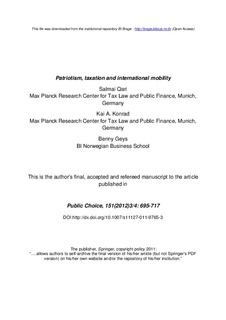| dc.contributor.author | Qari, Salmai | |
| dc.contributor.author | Konrad, Kai A. | |
| dc.contributor.author | Geys, Benny | |
| dc.date.accessioned | 2012-01-30T11:28:34Z | |
| dc.date.available | 2012-01-30T11:28:34Z | |
| dc.date.issued | 2012 | |
| dc.identifier.issn | 1573-7101 | |
| dc.identifier.issn | 0048-5829 | |
| dc.identifier.uri | http://hdl.handle.net/11250/93604 | |
| dc.description | Dette er siste forfatterversjon etter fagfellevurdering. | no_NO |
| dc.description.abstract | Patriotic citizens intrinsically prefer living in their native country compared to living in the Diaspora. In this paper, we analyze the consequences of such a “patriotic lock-in” in a world with international migration and redistributive taxation. One implication is that countries with more patriotic populations are associated with higher redistributive taxes. We then combine ISSP survey data with OECD taxation data and provide empirical evidence supporting this hypothesis. Our results provide a word of caution: the Treasury’s inherent interest in patriotic taxpayers may strengthen the political push for patriotism in an age of globalization and increased mobility. | no_NO |
| dc.language.iso | eng | no_NO |
| dc.publisher | Springer | no_NO |
| dc.subject | patriotism | no_NO |
| dc.subject | international mobility | no_NO |
| dc.subject | taxation | no_NO |
| dc.subject | redistribution | no_NO |
| dc.subject | fiscal competition | no_NO |
| dc.title | Patriotism, taxation and international mobility | no_NO |
| dc.type | Journal article | no_NO |
| dc.type | Peer reviewed | no_NO |
| dc.source.pagenumber | 695-717 | no_NO |
| dc.source.volume | 152 | no_NO |
| dc.source.journal | Public Choice | no_NO |
| dc.source.issue | 3/4 | no_NO |
| dc.identifier.doi | 10.1007/s11127-011-9765-3 | |
